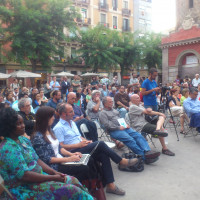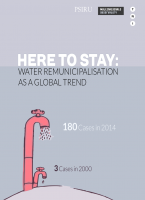10 Rousing Struggles for Public Water World Water Day 2017
Topics
While water privatisation continues to be imposed throughout the world, particularly in the Global South, more and more communities are demanding public management of water and wastewater services and forcing out private actors. On World Water Day we bring you 10 inspiring stories of communities and cities working to reclaim control over this essential resource.
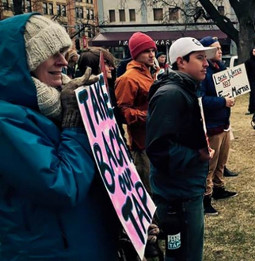
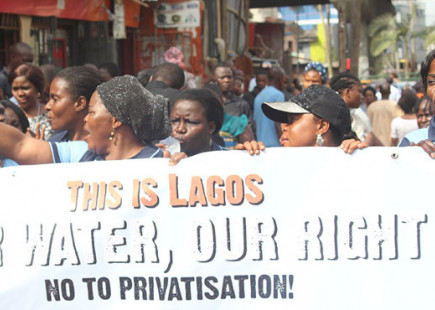
Lagos, Nigeria
In February 2017, the Lagos state government passed a law that could criminalise the collection of water from lakes and other natural sources. Unsurprisingly, there has been widespread opposition to the law, particularly as the state is caught in a water crisis. Environmental Rights Action (Friends of the Earth Nigeria) Deputy Executive Director, Akinbode Oluwafemi said that the ‘Our Water, Our Right’ campaigners who have staged protests across the state “remain resolute in rejecting all forms of water privatisation, semi-water privatisation or so called Public Private Partnerships”. Leo Heller, the UN special rapporteur on the human right to water has sharply criticised the government. US-based Corporate Accountability International is running an international petition to show solidarity.
Rio de Janeiro, Brazil
On February 20, 2017, Rio de Janeiro's state government passed a law to privatise state water company Companhia Estadual de Águas e Esgotos (CEDAE). Brazil's federal government insisted on the sale of the public company as a condition for an emergency loan to the state of Rio de Janeiro to help finance infrastructure for the 2016 Olympic Games. The law allows the state to access a US$1.1 billion federal loan and was a condition for suspending the payment of the state's debt to the federal government. Hundreds of people protested in front of the state Legislative Assembly on February 7, to denounce the proposed privatisation.
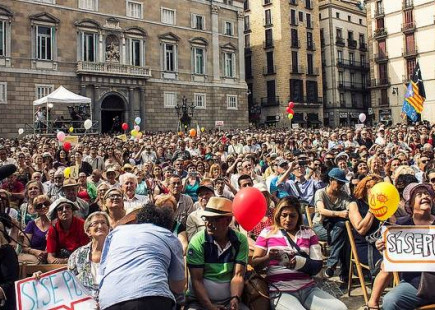
Barcelona, Spain
Barcelona has decided to institute a municipal water service to replace the corporate business Aguas de Barcelona, which has run the city's water for a century. Many other towns in Spain have, or plan to, remunicipalise their water services, despite stubborn resistance from private companies.
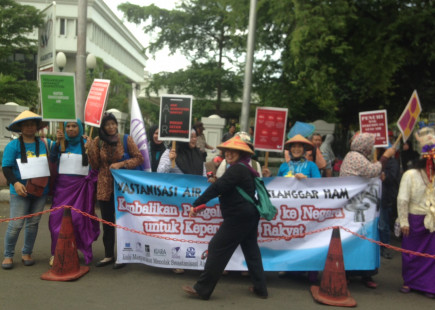
Amrta Institute
Jakarta, Indonesia
Privatisation of water services in Jakarta has failed. Just 59 per cent of Jakartans have access to piped water. The infrastructure is in bad shape with the leakage level as high as 44 per cent. Consequently, on 24 March 2015, the Central Jakarta District Court annulled the privatised contract following a citizen lawsuit. Water privatisation was deemed 'negligent in fulfilling the human right to water' for Jakarta's residents. However, the court ruling was overturned in March 2016, following appeals by private companies. Local campaigners have vowed to continue fighting.

Mafra, Portugal
The municipality of Mafra was the first municipality to privatise water and sanitation services in Portugal. On December 9, 2016, the municipality unanimously decided to terminate its concession agreement with the company Be Water. The decision was taken following the private operator's request for a tariff increase of 30 per cent. In a statement, the municipality described the request as 'unacceptable'. The municipality carried out an economic-financial and legal study, concluding that full municipal management of services will reduce tariffs by up to five percent.
Valladolid, Spain
In 1997, after nearly 40 years of public management of the integral water cycle, the Valladolid City Council granted a concession to Agualid-Aguas de Valladolid, whose parent company is the multinational Suez. In 2016, the newly elected Valladolid City Council decided to remunicipalise the water supply in the metropolitan area following the expiration of the private contract in July 2017. A key player behind the decision was the 100% Public Water Management Platform (PWMP), which fed the debate with a petition campaign and website.
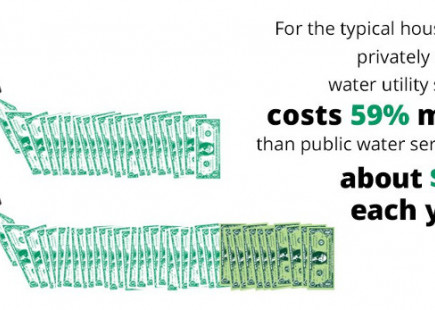
Terrassa, Spain
In December 2016, Terrassa city council voted to municipalise water supply services after 175 years of private management. Terrassa has a population of over 215 000 and is the fourth biggest city in Catalonia. If water services are municipalised, chances are high that it will serve as an example for other cities with similar aspirations. The existing concession contract was prolonged for 6 months, until June 30, giving the municipality more time to arrange a possible transition. Even though only symbolic non-binding steps have been taken so far, the debate in Terrassa is clearly tending towards municipalisation of water supply services. A large majority of the City Councillors are officially in favour of 'direct management of the water supply'. The remunicipalisation of the water in Terrassa could lead to savings of 3,650,000 euros per year. The city council can choose to use this money to lower water tariffs or improve the infrastructure or the quality and taste of the water.
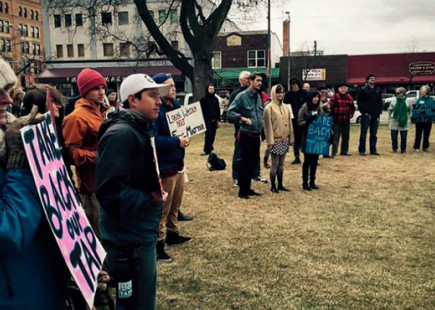
Missoula, Montana, USA
Missoula, Montana, scored a major victory for community ownership of public resources in August, 2016. The state's supreme court ruled that the city's use of its water system was 'more necessary' than its use by a private company. The city has been embroiled in a costly, years-long legal battle over control of its water supply. 'The city desired to own the water system that serves its residents because city officials believe a community's water system is a public asset best owned and operated by the public,' the judges wrote in their decision.
Apple Valley, California, USA
Since 2014 the Town Council of Apple Valley, located in Central California, has been determined to take back the town's water system -- Apple Valley Ranchos (AVR) -- because of excessive rate increases. The Council created a website explaining the need to reclaim the utility so as to provide a reliable and local source of water for Apple Valley's citizens. The Town Council encouraged debate by making available all reports from Council meetings, fact sheets about spending on audits, attorneys and public record requests, and clear and regular news updates. As a result, a survey showed that 73 per cent of the population supports the town's acquisition. Disregarding public opinion, the private operator AVR rejected the Council's offer to buy the water system. Soon after, in January 2016, AVR was bought by Liberty Utilities, a subsidiary of Canada-based Algonquin Power & Utilities Corp. In response, the municipality approved eminent domain action on the basis of compelling public interest and issued a formal condemnation to expropriate the private water company and remunicipalise the utility. The eminent domain action is expected to take several years.
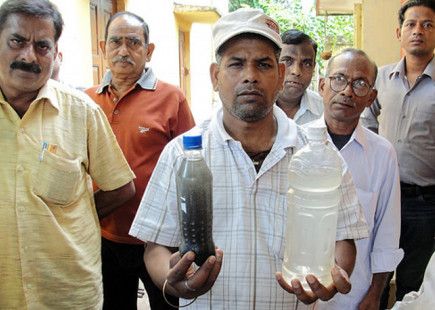
Mysore, Karnataka, India
In Mysore, a public-private partnership (PPP) was established between the public utility Mysore City Corporation (MCC) and private company Jamshedpur Utilities and Services Company (JUSCO) in 2008. Under the management contract, the private partner commits to undertaking rehabilitation, operations and maintenance, and improvement in water supply while the public partner retains control over capital expenses, bulk water supply and contracting. All project funding has come from public bodies and JUSCO is only managing services and collecting revenues from water bills. The six-year project was supposed to be completed in 2015, but the private company has not been able to deliver on several of its contractual obligations such as piped network extension, metering and household connections, among others. The private company has been penalised by municipal authorities for failing to meet agreed performance targets, while the private company also continues to face opposition from elected representatives, municipal authorities, social groups and residents largely due to poor service delivery. The private company was granted a six-month extension in January 2015 to complete the project, after which the water system was expected to return to Mysore's municipal authorities. Several other Indian cities are also struggling against privatisation or Public Private Partnerships



